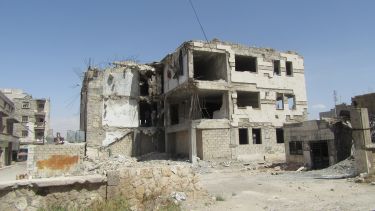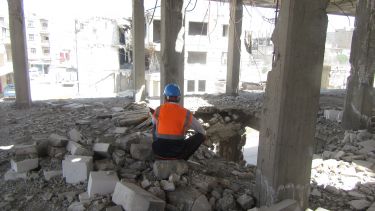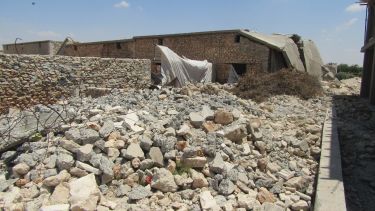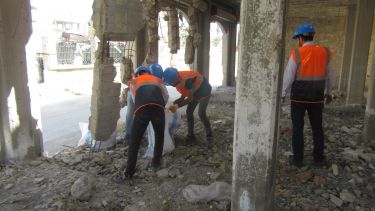- University of Sheffield researchers have found a way to recycle concrete rubble to help rebuild key infrastructure in Syria quicker and more sustainably
- Study shows for the first time that recycled concrete aggregate (RCA) made from rubble of destroyed buildings in Syria can replace up to 50 per cent of the raw materials used to make new concrete without significantly affecting its performance
- Researchers have been collaborating with exiled Syrian academics for the past four years to find new ways of reusing the huge amounts of rubble left behind by the civil war
- Guidelines could now also help Syria recover from the devastating earthquake as well as support other countries rebuilding from war and natural disasters
Concrete rubble left behind by war could be recycled and used to help rebuild key infrastructure quicker and more sustainably, according to new research from the University of Sheffield.
The study, led by Dr Theodore Hanein and Professor John Provis from the University’s Department of Materials Science and Engineering, has proven for the first time that recycled concrete aggregate - made from the rubble of war-destroyed buildings in Syria - can be used as a sustainable alternative to the raw materials in concrete.
The research, published in the Journal of Materials in Civil Engineering, proves that the rubble could replace up to 50 per cent of the raw materials used in concrete without significantly affecting its performance.
Dr Theodore Hanein, UKRI Future Leaders Fellow at the University of Sheffield, said: “Sadly, the ongoing civil war in Syria has left more than 130,000 buildings destroyed, and now after the devastating earthquake even more buildings have been damaged or destroyed in northern parts of the country. For the past four years we’ve been working with Syrian academics to find ways of reusing the vast amount of rubble that has been left behind by the war and we have now found a way to recycle it that could help the country recover once it comes to the time of rebuilding.
“One of the big barriers to reusing materials to make new concrete is determining whether the final product will be as strong and reliable as concrete produced in the traditional way. Our paper shows how this can be done in Syria, with the potential to replicate this work around the world.”
The work began four years ago when a group of Sheffield researchers wanted to help exiled Syrian academics who were fleeing the civil war. The Sheffield researchers used their expertise in sustainable engineering, in collaboration with experts from the Department of Civil and Structural Engineering and from Middle East Technical University (METU), Turkey, to coordinate a series of studies looking at how to reuse the vast amount of rubble being left behind by the conflict to help the country rebuild.
The Syrian academics visited the University of Sheffield in 2019 to perform research experiments, and the experimental study has been developed since then in Sheffield and at METU. The Syrian academics are conducting the research and are being supported by the Cara (Council for At-Risk Academics) Syria Programme.
Recycling the rubble would make rebuilding much quicker and cheaper as Syria wouldn’t need to import as many raw materials for construction. This would also help to reduce carbon emissions - making the rebuilding process more sustainable.
The idea of making concrete from rubble is not new, but this is the first time that a proven technique has been developed for buildings destroyed in war. As each country uses different materials to construct buildings, the properties of any new concrete produced using recycled rubble must be thoroughly assessed to ensure they meet the standards required for safe and reliable construction.
The technique could be used to help the country recover from the devastating earthquake that hit Syria and Turkey earlier this year (February 2023), and it could also assist other countries in rebuilding from war and natural disasters.
Kate Robertson, Cara Middle East/Syria Programme Adviser, added: “Cara is most grateful to this amazing group of researchers from Sheffield and METU, who have given their time to help guide and support this incredibly important work in the context of Syria. It is envisaged that using these methods to help rebuild Syria could create the foundation for it to become a technological hub for green and circular materials and construction solutions in the region into the future. All the more important given the devastating earthquakes that have struck both Turkey and Syria.”
Professor John Provis, Professor of Cement Materials Science and Engineering at the University of Sheffield, said: “We are very pleased to be able to build lasting collaborations through the support of Cara for our work with Syrian colleagues, and we hope that this work can help to rebuild destroyed infrastructure and improve quality of life for people who have been severely impacted by the war in Syria, as well as by the tragedy of the recent serious earthquake in the region.”
Dr Maurizio Guadagnini, Senior Lecturer in Civil and Structural Engineering at the University of Sheffield, added: “The ongoing collaboration with our Syrian colleagues will assist the development of cost-effective and sustainable building solutions. This work will support the implementation of technologies that can help create more resilient communities and address critical global challenges.”
Dr Cagla Meral Akgul, Associate Professor at METU said: “We are proud to collaborate with Syrian colleagues through Cara. We hope that these scientific achievements will aid rebuilding efforts while preserving the academic heritage of Syria.”
Rebuilding Syria from the Rubble: Recycled Concrete Aggregate from War-Destroyed Buildings is published in Journal of Materials in Civil Engineering. Read the paper.
Contact
For further information please contact:






